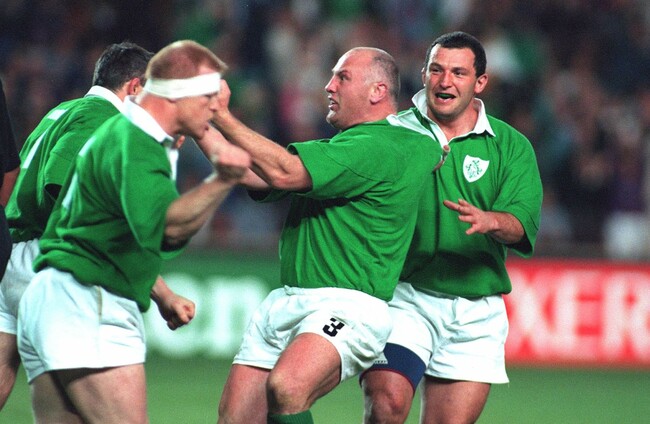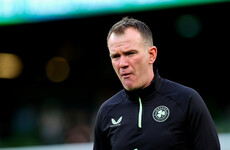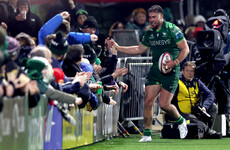IT’S PARTLY DOWN to luck of the draw, part by-product of the failure to get through the quarter-final stage, but today marks just the second time Ireland will meet New Zealand at the Rugby World Cup.
While our RWC history is littered with tales of Argentine and French clashes, or the five times that Australia have obstructed Ireland’s path in nine World Cups, their neighbours from across the ditch have only had the pleasure in 1995.
And what a pleasure it is to watch it back. The warm satisfaction on review is not just down to Jonah Lomu’s great opening act on the world stage, it’s all the little flourishes of amateurism that frame his arrival like sunrise at the dawn of professionalism.
The baggy jerseys, the tapped penalty set-plays. A foot in touch and no need for the TMO. Keith Wood with some hair. Scrums that effectively commence with a running start. Referee Wayne Erickson’s moustache. Naive mistakes, panic on the bounce… ah here, Gary Halpin and his two middle fingers raised in triumph.
“Personally, I regretted it but people got some enjoyment out of it and I always got a laugh out of the fact that Tony Ward thought it was appalling,” Halpin told the Independent a decade on.
“Others thought it brought a bit of pageantry almost. In those pre-professional days we had a feeling that the New Zealand players were almost god-like – they had that aura of invincibility about them.”
Up your aura, then.
“On previous tours they had looked on us as second class citizens, in a sporting context, and it was very much a reaction to that. It was born out of frustration more than anything else.”
And that frustration is understandable when those black jerseys – for 111 years – continuously found a way to float above the very best Irish efforts. Three years before the World Cup opener in Johannesburg Ireland lost a tour match 59-6 to their hosts. A result that blew away the sense that Ireland weren’t all that far away with the average margin of defeat sitting at 7.45 points in 11 Tests before that.
So as New Zealand racked up a 19-43 win that was their second-largest winning margin over Ireland (it’s been bumped down to seventh since), there was greatness in the slight form of Andrew Mehrtens wafting in among the super-charged forwards like current Japan coach Jamie Joseph, Sean Fitzpatrick and Ian Jones. And there was awe at the 18 stone Lomu could carry round at such pace.
Poor Michael Bradley’s hacked clearing kick from the base of a 29th minute ruck might have gone unpunished in the Five Nations. But with a wing standing 6’5″ his attempt to get the ball away delivered it to the bread basket of the most dangerous talent the game has known.
The eventual runners-up in the tournament ran in five tries while setting the tone for how the ‘rivalry’ would unfold up until 2016. Yet they did not have exclusivity on scoring brilliant tries in Ellis Park on 27 May 1995.
Halpin’s heroic early effort sticks in the mind thanks to his celebration and David Corkery produced a lovely stepped finish with four minutes remaining, but the pick of Ireland’s scores was rounded off by Denis McBride.
Simon Geoghegan and Jonny Bell created a thrilling break down the left wing before the half-time whistle, and McBride arrived like Sean O’Brien behind Jonathan Davies on the 2017 Lions tour to finish after Bradley was hauled short of the line.
Trouble was, the All Blacks always had a response, always had another gear. Though he scored two tries on his Rugby World Cup debut, his finest input on the match was a sensational show of power and agility as he burst into enemy territory, side-stepping four tackles before off-loading from the fifth to the supporting flanker Josh Kronfeld.
Ireland’s second meeting with the inaugural World Cup winners, the now reigning champions without a loss since 2007, will be a very different kind of contest.
If Joe Schmidt’s side can break new ground and overcome New Zealand today then another rare beast, England, will likely await in the final four.
In Rugby World Cup terms, the oldest of enemies would be a new one for Ireland. But nobody would complain if a sixth clash with Australia came about instead.
The42 is on Instagram! Tap the button below on your phone to follow us!











For all the doom and gloom talked about Tottenham this season (no signings, stadium delays, Poch to United, out of both domestic cups), they continue to jog just behind the top 2, while keeping the top 4 dogfight just out of sight in the rearview mirror. One loss and they’ll be branded bottle jobs again, but with Wembley form picking up, and a tasty tie against Dortmund coming up, I can’t help but be happy.
Hanging on in there. Not at their best but picking up another win. COYS
Spurs are the type of football club that would give ya the horn.
@limofax: just like your ma, good stuff.
COYS
I can’t suffer Michael Oliver either.
He was the last one picked in school who:
1) you stuck in nets cos he’s brutal at football
2) you then told him to keep time cos he was crap in goal
3) eventually made him referee cos he was brutal at everything else, then became a brutal ref
Leicester should have been out of sight but Spurs more clinical with the chances they had